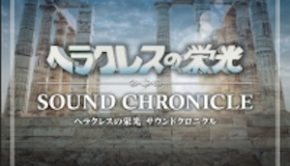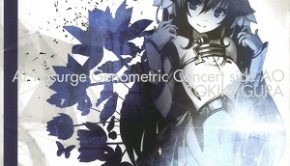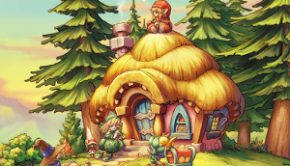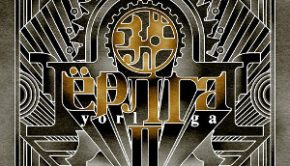Shadow Hearts -From the New World- Original Soundtrack
 |
Album Title: | Shadow Hearts From the New World Original Soundtrack |
| Record Label: | Team Entertainment | |
| Catalog No.: | KDSD-00078/9 | |
| Release Date: | August 24, 2005 | |
| Purchase: | Buy at CDJapan |
Commentary
Hirotomi Imoto – Sound Director
It happened one afternoon. In the center of the production floor, a group of people had formed a circle and were talking in hushed tones. Why are you in a circle? Why are you whispering? Oh, they’ve probably discovered a bug and are talking about it, I thought as I approached. “The mastering is done! The production is over!” Having navigated the stormy production, like drinking flat carbonated water, they let out a distasteful expression one moment before immediately returning to normal.
Hello, this is the sound director, Hirotomi Imoto. This new work in the Shadow Hearts series, From the New World, is new in every way, but still recognizably a Shadow Hearts game. With an emphasis in the sound department on retuning home, we introduced “thirst” as a new thematic direction befitting this new world. It is the thirst of humans for connection and also that of the desolate earth. As production progressed, this word — encompassing so many different senses — took on a special significance for the game. In their hatred humans, without shedding a single tear, separate and cause sadness, as cold and sharp as a knife. And then there are times when tears have dried up. There are no other words to describe it! Well, that’s getting into purple prose, but I feel it came naturally out of the production.
My good friend Yoshitaka Hirota has built a dark sound world, chaotic and wild. Even though he is very calm in person, his music can knock you out with its terrifying power. On top of that, Tomoko Imoto’s delicate heart-tugging emotion and Ryo Fukuda’s eccentric, absurd shock add their own individual expressions. This time, we have also made use of chorus throughout in order to make the story even more exciting. Combining all of these different ingredients in exquisite combination, from Ikuko-san to Shikata-san — from whom I have requested liner notes — it is a deep soundtrack, with every part having its own flavor.
If there are pieces from the game you want to hear over and over again, then this soundtrack was made for you. If you have thought to yourself “Excuse me sir, but I don’t know what they’re singing,” well, this soundtrack has something for you too. You may find what you’re looking for if you turn forward a few pages. Finally, I would like to express my gratitude to everyone who got this soundtrack. I want you to experience a new world, beyond what was in the game.
Yoshitaka Hirota – Lead Composer
“As long as the sun and earth exist, so can you. When the earth has no light and all is dead, nature will remain. Be aware of what you are.” – Sacred Words of the Native Americans
The first piece of music I wrote for Shadow Hearts From the New World was Disc 2’s “Dream Catcher.” It is used in a scene in which the main characters renew their resolve. As the first piece of music I write for a project and the ideas behind it tend to have a decisive influence on the sound of what follows, I was rather nervous. For this project, in my search for a way to begin composition, I studied the culture of the adventure’s setting, the Americas, especially the history of their native peoples. In their teachings and traditions, they knew how to describe the human heart in ways we in modern times have lost sight of.
How to coexist with the earth, how to read and understand the teachings of nature, how to accept change. That if one believes, one can see one’s own form, and that power is something that is given shape in one’s way of life.
They provided many hints in my search for points of connection between ethnic music and electronic music. Then I found the above words, and, feeling for a moment that everything was connected, I found harmony between ancient and modern instruments, as you can hear. A powerful musical concept came into my mind.
I used the didgeridoo, an Australian instrument used in ceremonies and the like, in the opening of “From the New World” and in the middle of “Et Unam,” and the unique throat singing technique of Mongolia in “Great Ghost Dance” and “Dream Catcher.” In a number of scenes and some of the battles, percussion such as the South American cajón can be heard. So I wove the notes one by one, whether the sound was from the Americas or elsewhere, without regards to the time period, in order to create a new world of music. And my encounter with flutes was particularly important. As if guided or possessed by some force, I became absorbed in trying out all kinds of ethnic flutes, recorded and sampled alike.
Even though the production was filled with difficulties, as a composer, it was a blissful experience. This project opened up a new world of music in my mind, and I won’t forget it for the rest of my life.
To all of the performers, you made recording into a moving experience. To Ikuko-san and Shikata-san, who lent power to the music and gave a voice to the spirits, I am truly thankful. And to Tomoko Imoto-san, my co-composer, you added beautiful color to this score with your consistently wonderful music. I also loved the pieces that Hirotomi Imoto and Ryo Fukuda wrote. I am grateful to all of the production staff, and all of those who have continued to encourage me. There would be no greater joy for me than for this music from the new world to resound in your hearts.
Tomoko Imoto – Composer
This game’s production was under an extremely tight schedule. I proceeded begrudgingly towards my goals, but a week before the data was due, I caught the flu. How can these things keep happening, I wondered, and thought there was no God. Looking back, I wonder if it may have been a test. Well, let’s get away from complaining about production and talk about the soundtrack.
The game is From the New World. A lot of the scenery glistens and jumps out at the eye, and likewise, the characters are almost too unique! I felt nervous having to match the visuals with my compositions. And the piece I love the most is the one that gave me the most difficulty, “Pirates of the Caribbean.” Mr. Imoto, the sound director, told me “they’re pirates, so make it piratey. They’re bandits, you know, bandits!” Uh-huh. So, imagining skeletons crossing swords on the dark and stormy seas, I was surprised to get the completed map and find that, hey, isn’t this like a certain amusement park that features a mouse? But, thinking about Shadow Hearts’ worldview, wouldn’t it destroy the atmosphere if I wrote something like “It’s a Small World”? In the end, after all my worrying, I thought to myself “the map itself is cute, and the pirates’ boss is pretty,” so I arrived at the atmosphere in the final version. I should make all of my music this straightforward! That was what I was thinking, but how do you think it turned out?
Anyway, I am happy that I was able to be involved with the production of From the New World. I am grateful to the staff, who supported me even though I did nothing but complain. And finally, to all of the players who are now listening to this soundtrack, thank you very much. I hope for the best for Shadow Hearts in the future, too.
Takehara Tomoaki – Lyricist / Vocalist
“When did we become adults? In an instant, the energy of our youth was spent.”
That was a line from the song “Growing up” by the funk band I do lead vocals for, “Taste of Chocolate.” I also wrote the lyrics, and whenever I’m singing these lyrics live, I wonder “when did it happen to me?” If I think too much, I’ll lose track of my lines while singing (great). Have I really used up all of my youth? Or perhaps such a thing never actually existed? It’s subjective, but I feel that the gap between those who have become adults and those who haven’t yet is quite large. The former take the word as a compliment, and the latter feel that they have to hide their laziness and compromise in the shadows of “adults.”
When I was a kid, I was always thinking “I want to be popular with girls!” (Same now.) It was a step on the shortest path to becoming an “adult.” I didn’t understand the more awkward parts of becoming an adult, such as socializing with neighbors or paying taxes, so the idea of becoming an adult, no longer bound by the rules of school or society, appealed to me and my classmates. In that way, maybe I’m the same today. What has changed for sure, though, is that I now have fewer superiors and acquaintances to me that I am mistaken.
In this era, as contact with other people becomes rarer, what can teach us the rules behind everything? Could it be that RPGs are taking on a part of that role? You form a party, share sadness and pain together, and tear down the walls that stand in your way to go forward. They present everything from hope to despair, from the future to dreams. Since it is all under your direction, you can even cultivate your leadership skills. Everything remains within a virtual world, so you don’t feel true pain, but it can’t be a bad direction for one’s consciousness to take.
The big problem is when people don’t take these things outside of the game. In reality, they fail and suffer a setback, apologize to various people, but in an instant forget the lesson they had learned, and return to the same error they made before. It takes a long time for a person to grow from their experiences, and one cannot reset one’s experience of life. So isn’t it good for one to enjoy living this life that is so different from an RPG all the more because it is different?
Hmm? You’re wondering how I could ever get such complicated and heavy feelings about a game? Fair enough. You have to enjoy your entertainment after all. By the way, now, as an adult, I’m secretly planning on returning to being a child if I have a good opportunity.
Akiko Shikata – Chorus / Choral Work
It happened one afternoon. I received an urgent call from the sound director on my cell.
“Shikata-san, it’s a men’s festival!”
“What?”
“It’s about the chorus work you did for the earth fusion monster a while back. Instead of an earth spirit, it’s a men’s festival! Everyone’s naked and sweat is flying everywhere!”
Wow…
“Even though they’re spirits, it stinks of sweat! What will we do?”
“Sorry, sorry, sorry, I’m going to re-do the chorus right away!”
The order I received from the sound director at the beginning said “imagine the howl of a wild beast, powerful and untamed.” The movie and the demo music were so wonderful that I ended up over-doing it. Powerful -> native African spirituals -> African drumming -> the rhythmic heaving of a festival -> the scorching sun! Glistening beads of sweat flying about!! Just like a naked men’s festival!!! (“How did it Come to This?” by Imo). Or so the progression/retrogression/perversion/delusion went in my mind. Anyway, my problem was overenthusiasm, and I can’t help but laugh about it now; great memories, definitely. To help out Tomoko Imoto, that men’s festival chorus underwent a divine transformation to color the Aztec sun god festival. I’m really sorry that this paragraph smells so much of sweat.
I apologize for the belated greeting. I’m Akiko Shikata; I worked on the chorus and choral arrangement for Shadow Hearts: From the New World. With its varied challenges, this job allowed me to sing some very interesting music, and I was able to make use of a full choir, from high voices to a deep and full bass, an opera aria, from mysterious sounds to depict the spirits to sub-human shouts and growls. I was always throwing out changeups, asking “how about this,” and they caught every one. The performances far surpassed my expectations, and I have nothing but respect and gratitude for the sound director and composers for having given their all.
For the songs and choral lyrics that I provided, I used languages such as Italian; please allow me to provide a brief explanation for the aria that plays in the Chelsea Erick Theater. The aria I used comes from Mozart’s opera Idomeneo, from a recitative and the following aria sung by Electra, the daughter of Agamemnon, king of Argos. In this justifiedly famous aria from the opera’s third act, Electra, separated from her love, expresses her despair and madness. You should listen for Electra’s laugh at the end. By replacing the lyrics for the glorious melody that rises to the aria’s highest note before descending with laughter, I feel I was able to express the depth of her passion and fury. When the sound director approached me about putting in an operatic aria and explained the scene to me, this was the first aria that popped into my head. I hope that you enjoyed that laugh as well as the cutscene it accompanies.
Finally, before I lay down my pen, allow me to express my deepest gratitude to everyone who was able to bring this soundtrack to completion, and to all of the players who have listened to the soundtrack. Thank you very much.
Takamusa Ohsawa – Producer
An immature and unreliable protagonist.
A heroine that fuses with spirits, not demons.
It is 1929 in America.
New York, the Grand Canyon, Chicago, the Caribbean, the ruins of South America.
These people who lived in this era, friends who wandered around the continent.
These concepts, conceived separately, expanded and changed.
And so the world of Shadow Hearts is deepened.
Translated by Ben Schweitzer. Edited by Ben Schweitzer and Chris Greening. Please do not republish without written permission.
Posted on May 9, 2013 by Ben Schweitzer. Last modified on March 11, 2014.














